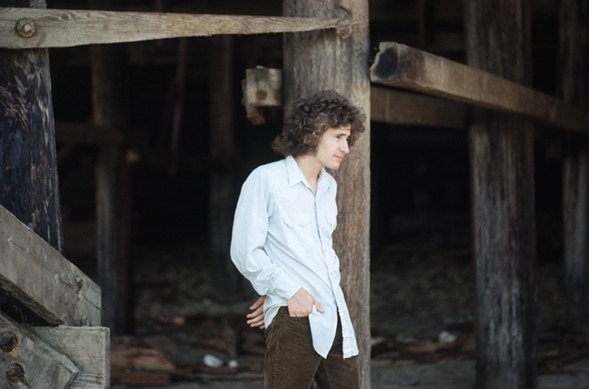|
by Peter Margasak
In
a post last week, I lamented the inevitable gap between how
many great albums come out and how many I'm actually able
to listen to. I could probably spend the rest of 2018 posting
about worthwhile stuff that I missed in 2017—though of course
I won't, because I'd rather try to keep up with this year's
onslaught.
But
before I move on, I'd like to give props to a pair of previously
unissued live recordings by the great LA folk-rock singer
that dropped late in 2017. Venice Mating Call and Greetings
From West Hollywood are both double albums on the Manifesto
label (the first on CD, the second on vinyl) recorded during
the same extended engagement that produced the stellar 1994
archival release Live at the Troubadour 1969.
Coproducers
Bill Inglot and Pat Thomas, who also wrote the liner notes
(they're identical on both titles), compiled these collections
from tapes they discovered in the archives of former Buckley
manager Herb Cohen, which include tunes that don't appear
on that earlier live release.

Photo Courtesy of Manifesto Records |
This
material gives the listener an opportunity to bask in the
improvisational genius of Buckley and his limber band, especially
guitarist Lee Underwood, who adds post-Joe Zawinul Fender
Rhodes on a handful of songs. (Percussionist Carter C.C. Collins,
bassist John Balkin, and drummer Art Tripp round out the lineup.)
As
the notes point out, these performances occurred at an important
transitional point for Buckley: he was leaving behind the
succinct jazz-flavored folk of his excellent 1969 albums Happy
Sad and Blue Afternoon (the latter of which was still two
months from release when these performances occurred) in favor
of the expansively psychedelic experimentation of the 1970
releases Lorca and Starsailor.
These
unearthed recordings capture the fearless exploration that
underpinned that shift. Some of the tracks on Venice Mating
Call would end up on Lorca, where they're titled "Anonymous
Proposition" and "Lorca," but on the original tape boxes they're
called "Slow Samba" and "5/4," indicating that they were in
a state of incubation. Judging from these recordings, Buckley
and his band navigated the change with confidence, never hesitating
or stumbling—their fearlessness and superior musicianship
make these excursions feel like exhilarating tightrope walks.
According to the notes, at the time Buckley and Underwood
were ingesting serious doses of the Miles Davis proto-fusion
classic In a Silent Way, released two months prior to these
gigs, and the impact is clear.
Sadly,
Tim Buckley comes up in public discussions more often because
he's the father of Jeff Buckley than he does for his own work,
which has retained its mysterious power for five decades.
He had one of the most strikingly original and tensile voices
in the history of American music—a kind of bottomless vessel
for powerful, nuanced expression that seemed to contain ideas
not only from all over this country but also from around the
globe, filtered through his distinctive syncretic aesthetic.
If you listen to these releases alongside Troubadour, you
can hear how radically different many of the same songs are—sometimes
because Buckley transplants vocal rhythms from one tune into
another. The creativity on display here feels incredibly malleable,
unfettered, and open-ended. Below you can hear one of the
most far-out selections, a deliriously dilated version of
"Gypsy Woman" from Venice Mating Call.
©
2018 Peter Margasak/ChicagoReader.com
|